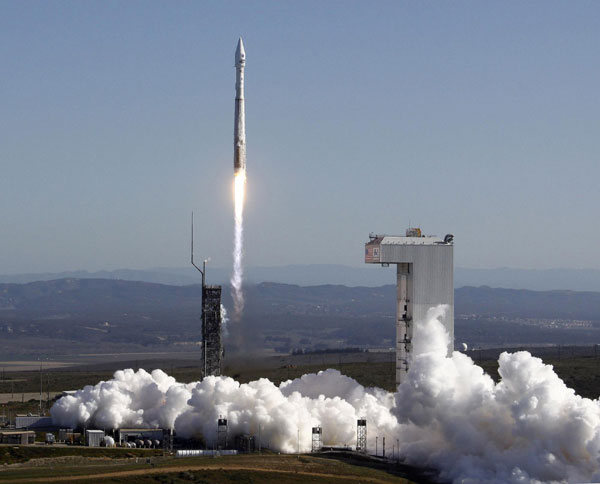NASA launches new earth observation satellite
Updated: 2013-02-12 09:51
(Xinhua)
|
|||||||||||
 |
|
The United Launch Alliance (ULA) Atlas-V rocket with the Landsat Data Continuity Mission (LDCM) spacecraft onboard is seen as it launches at Vandenberg Air Force Base, California, Feb 11, 2013. The LDCM mission is a collaboration between NASA and the US Geological Survey that will continue the Landsat Program's 40-year data record of monitoring the Earth's landscapes from space. [Photo/Agencies] |
WASHINGTON - NASA's latest Earth-observation satellite, the Landsat Data Continuity Mission (LDCM), roared into space on Monday from Vandenberg Air Force Base in California, the US space agency announced.
The spacecraft is the eighth satellite in the history of the Landsat program, a joint NASA/United States Geological Survey (USGS) project that has been monitoring forest loss, glacial retreat, urban sprawl and other phenomena continuously since Landsat 1 lifted off in July 1972.
The satellite will eventually settle into a polar orbit with an altitude of 438 miles (705 kilometers). NASA will conduct key checkouts of the spacecraft over the next three months, after which it will be turned over to the USGS for operations and renamed Landsat 8.
"Landsat is a centerpiece of NASA's Earth Science program, and today's successful launch will extend the longest continuous data record of Earth's surface as seen from space," NASA Administrator Charles Bolden said in a statement.
"This data is a key tool for monitoring climate change and has led to the improvement of human and biodiversity health, energy and water management, urban planning, disaster recovery and agriculture monitoring -- all resulting in incalculable benefits to the US and world economy," said Bolden.
Related Stories
NASA finds billions of Earth-size planets 2013-01-08 11:23
NASA to launch ocean wind monitor to ISS 2013-01-30 10:48
NASA posts video debunking Maya 'Armageddon' 2012-12-21 09:28
Twin NASA probes plunge into lunar mountain 2012-12-18 10:12
NASA moon-mapping mission to come to a crashing end 2012-12-14 10:28
NASA aims to launch Mars rover twin in 2020 2012-12-05 09:42
Today's Top News
Police continue manhunt for 2nd bombing suspect
H7N9 flu transmission studied
8% growth predicted for Q2
Nuke reactor gets foreign contract
First couple on Time's list of most influential
'Green' awareness levels drop in Beijing
Palace Museum spruces up
Trading channels 'need to broaden'
Hot Topics
Lunar probe , China growth forecasts, Emission rules get tougher, China seen through 'colored lens', International board,
Editor's Picks

|

|

|

|

|

|





